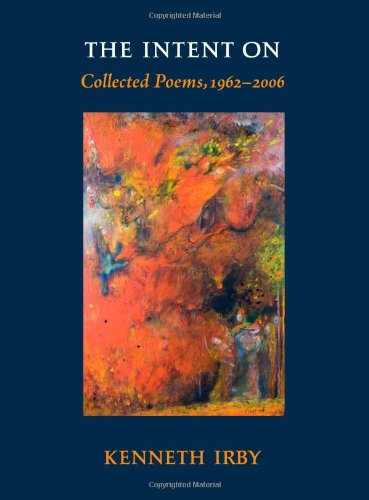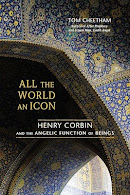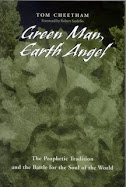"...the Imagination (or love, or sympathy, or any other sentiment) induces knowledge, and knowledge of an 'object' which is proper to it..."
Henry Corbin (1903-1978) was a scholar, philosopher and theologian. He was a champion of the transformative power of the Imagination and of the transcendent reality of the individual in a world threatened by totalitarianisms of all kinds. One of the 20th century’s most prolific scholars of Islamic mysticism, Corbin was Professor of Islam & Islamic Philosophy at the Sorbonne in Paris and at the University of Teheran. He was a major figure at the Eranos Conferences in Switzerland. He introduced the concept of the mundus imaginalis into contemporary thought. His work has provided a foundation for archetypal psychology as developed by James Hillman and influenced countless poets and artists worldwide. But Corbin’s central project was to provide a framework for understanding the unity of the religions of the Book: Judaism, Christianity and Islam. His great work Alone with the Alone: Creative Imagination in the Sufism of Ibn ‘Arabi is a classic initiatory text of visionary spirituality that transcends the tragic divisions among the three great monotheisms. Corbin’s life was devoted to the struggle to free the religious imagination from fundamentalisms of every kind. His work marks a watershed in our understanding of the religions of the West and makes a profound contribution to the study of the place of the imagination in human life.Search The Legacy of Henry Corbin: Over 800 Posts
Wednesday, October 29, 2014
Tuesday, October 21, 2014
Corbin & American Poetry - Oct 21, 2014
"There is a relentless generosity to Joseph Donahue’s newest collection, as seemingly everything can find its place among the contours of his poetry. By turns worldy and visionary, Red Flash on a Black Field accommodates Charles Olson and David Lynch, Nietzsche and a theology bursting from pure, luminous words of radical intent. In the hands of this consummate craftsman “consciousness is a continual fire” and the world of words is ablaze." - Susan Howe
There is a good interview with Joe about this book and other things in The Conversant. He says,
"In the last few years I have been drawn to the literature of esoteric Islam, certainly for its extravagance of devotional expression and its exploration of visionary states of being, but also to help me fathom a simple and yet difficult ambition of lyric poetry, the ecstatic cry. Why is such a little mouthful of air so hard to get right? Perhaps this is so only to the ecstatically challenged, such as myself. But it seems to me the simple exclamation of joy or despair, both to utter and interpret, demands a thinking out the nature of the world: what forces large and small have brought these syllables to be?"
Thursday, October 9, 2014
Corbin and American Poetry - Oct 9, 2014
Ross Hair
University of East Anglia
Journal of Modern Literature
vol. 36, no. 3, 2013, p. 174-193
Online courtesy of Les Amis de Henry et Stella Corbin
Wednesday, October 8, 2014
Corbin & American Poetry - Oct 8, 2014
I want to rectify some omissions that I meant to get to long ago and I have realized that I never did. When I was first exploring the relationship between Corbin and poetry I was in touch with several different poets who gave me invaluable information and assistance. One of them was George Quasha whose work with and about Robert Kelly on ta'wil and related matters is absolutely central to understanding how Corbin's work made it's way into the poetry of the 60s and 70s. Early on Quasha mentioned three poets who were foremost among those influenced by Corbin: Gerrit Lansing, Kenneth Irby and Theodore Enslin. I never followed this lead and I have I think never posted anything about any member of this fascinating trio and this is an important hole in the account I have provided sporadically on this blog. I here officially acknowledge this lack and add their names to the list.
Gerrit Lansing is the author most recently of Heavenly Tree, Northern Earth (2009).
On his PennSound page "Lansing talks with Charles Bernstein, and guest Susan Howe, at Lansing’s house in Gloucester, Mass. Lansing, a close friend of Charles Olson, discusses the wild of Gloucester, the relation of the magic (and the magical) and the occult to poetic practice, Nerval, queer politics and the poetics identity, New York in the immediate postwar period, parapsychology at Harvard in the late 1940s, Gnosticism versus neo-Platonism, Jewish mysticism, and his connections with Henry Murray, Harry Smith, Alan Watts, Aleister Crowley, Carl Jung, and John Ashbery.
Kenneth Irby is Associate Professor at the University of Kansas and his collected poems was published in 2009 as The Intent On.
His PennSound page of readings is quite extensive, and here he is reading at Berkeley.
Theodore Enslin died in 2011 in Milbridge, Maine where he had lived since 1960. To my mind he was the most fascinating character of all. If I had been paying attention I might well have been able to meet him as Milbridge is scarcely 2 hours from my own homestead in rural Maine. This brief appreciation provides a sense of the man: With Great Respect. Though he lived in relative isolation far outside the mainstream he was extremely prolific, publishing roughly 60 books of poetry including a selected poems Then and Now in 1999. And here is a fascinating interview with Enslin and Robert Bertholf on music and poetry.
[The dated heading for this post acknowledges the fact that I long ago lost track of how many entries there have been in this "series" & I should have dated each entry from the beginning.]
Tuesday, October 7, 2014
Corbin & American Poetry - Robert Kelly
As I've mentioned before, Robert Kelly is one of the most important poets to have put Corbin's work to use. This new collection of essays is very much worth your attention. Though there is no explicit mention of Corbin in these 800 pages, there are three occurrences of ta'wil. On p 284 is the justly famous comment that "A poem is the ta'wil of the first word written down." Perhaps more striking to me is the commentary on Charles Olson and the Angel, which begins on 171 - Olson was, Kelly says, particularly in the late, post-Maximus work, a man in search of his Angel. [I have written about the Olson/Corbin connection many times, and Maud's excellent Charles Olson At the Harbor - see here for instance.] There is so much of interest in this immense volume that it seems to me indispensable.
A companion book, forthcoming [this Fall?] from Contra Mundum, A City Full of Voices, will include the full text of the seminal 1974 collaboration Ta'wil, Or How to Read which I have pointed to several times here. And I will whet the appetite of all with an interest by mentioning that this volume will also contain an essay by George Quasha, "Uncertainties," which discusses Kelly's poetics and the entire complex of issues involved with the poetics of ta'wil, the visionary recital, initiation, creative imagination and alchemy. It is, it seems to me, quite wonderful and utterly essential reading for anyone interested in these matters.
Thanks to Pierre Joris for co-editing these books and for drawing our attention to them.
Sunday, October 5, 2014
Friday, October 3, 2014
L'Envers du Monde
The first volume of the Corbin series is now published in French
and is available from Entrelacs here.
Subscribe to:
Posts (Atom)












